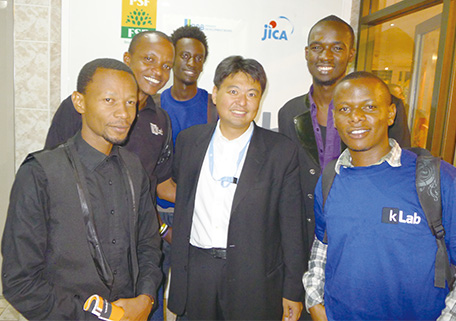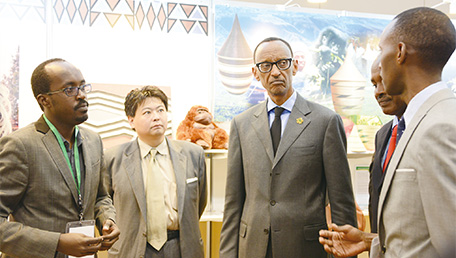Japan's Official Development Assistance White Paper 2013
Stories from the field 07
Implementing Strategic Plans for ICT Designed by Rwandans Themselves
– Supporting efforts to build foundation for ICT as national development and business endeavor –

Mr. Yamanaka with the students and ICT entrepreneurs of kLab (Photo: Atsushi Yamanaka)
Rwanda. A country with a history of ethnic conflict that exploded into genocide in 1994. Although it continues to be strongly associated with this tragic history, in recent years, the country has in fact achieved political stability, and is even now known as an “African Miracle” for its safety and cleanliness. According to research by the World Bank, Rwanda is currently the second easiest African country to do business in. Moreover, it is experiencing satisfactory annual economic growth of around 8%.
In 1998 though, the outcomes of the civil war meant that Rwanda was struggling with insufficient human resources and almost no remaining fundamental infrastructure. It was against this backdrop that the national government decided to use information and communications technology (ICT) strategically as a means of reconstructing the country from square one. National ICT Strategies and Plans have been implemented under the strong leadership of the president as a pillar of the country’s development for each five year period between 2000 and 2020. As a result, Rwanda has become a country with an ICT infrastructure that any developing country should be envious of.
JICA expert Mr. Atsushi Yamanaka supported the Rwandan Government in the formulation of the Third National ICT Strategy and Plan for one year and five months from March 2009. After that, he cooperated with the implementation of that plan for an additional one year and five months from July 2011. For the planning stage, the government, business community, NGOs, educational institutions, and other stakeholders were gathered to discuss ideas for how ICT could be used and consider the direction for the strategy and plan. Mr. Yamanaka served as a strategic planning support advisor for this process.
“Rwandans are not particularly good at talking about how they really feel. I realized that discussing the topic from the basics and then deciding on a direction for policy would take an enormous amount of time. But I wanted the Rwandans to take ownership of their initiatives and take the lead on the issues facing their country. That’s why I set up the process the way I did. Just formulating the strategy and plan took approximately a year.”
At the time of the enhancement of the country’s ICT strategy in 2000, Rwanda accepted many proposals from overseas aid organizations and private companies. But various problems arose in the implementation stage because the proposed strategies did not sufficiently take into account the wishes of the Rwandans themselves. For that reason especially, Mr. Yamanaka insisted on a Rwandan-led strategy and plan.
The Rwandan Government believed that the growth of the private sector was indispensable to the spread of ICT, and so in 2011, it established the Chamber of ICT of Private Sector Federation (PSF) Rwanda. Furthermore, the Government, the PSF Chamber of ICT Rwanda, and JICA started an innovation center called “kLab”,* as a facility supporting the development of services and products using ICT created by young people who are either aiming to start companies or who have already become entrepreneurs.
Those young entrepreneurs have produced such achievements as the creation of inventory systems for local beer companies and pharmacies, websites with databases, and cloud sourcing solutions. Mobile phones use is growing in Rwanda, and as such, development on apps and systems for mobile devices is proceeding at a higher pace than development for PCs. These apps and systems are also being offered to local companies for use.
During his tenure, Mr. Yamanaka worked to sell Japanese stakeholders on the latent capabilities of Rwandans for ICT. He supported the training in Japan for members of the PSF Chamber of ICT in Rwanda and worked to create a bridge between Japanese companies and Rwanda. Those results paid off – Rwanda is currently receiving support from the Japan External Trade Organization (JETRO) and there have already been cases of collaboration, such as Japanese companies placing orders with Rwandan IT firms for the development of smartphone apps. With their serious nature, conscientious attitude towards deadlines, and ability to flexibly react to change, Rwandan workers are being highly evaluated by Japanese businesses.
“Africa as a market is right now experiencing rapid growth, and the Japanese brand has already established a high level of trust in Africa. It is for these reasons especially that I want to now construct win-win relationships between Japanese companies and Africa. In particular, with the support of JICA, we will develop businesses in African countries from the base of Rwanda, which already has a strong relationship with Japan. I think that this will be extremely effective.”
Japanese support can be a catalyst for economic development, and the relationships that support creates can work as a foothold for the entry into African markets by Japanese companies. The project in Rwanda demonstrates the grand potential for the creation of win-win relationships in countries receiving Japanese support via ODA. For these reasons and beyond, Mr. Yamanaka’s activities continue to be highly regarded throughout Rwanda.
* The k stands for “Kigali” the country’s capital city where the laboratory is located, as well as the k of “knowledge.”

Mr. Yamanaka and the President of Rwanda (third from the left). The Chamber of ICT of Private Sector Federation advertised Rwanda ICT industry at a booth during TICAD V. (Photo: Kobe Institute of Computing)
